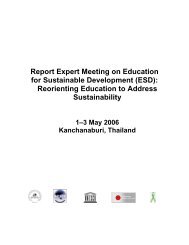Module 11 | Indigenous knowledge and sustainability - APCEIU
Module 11 | Indigenous knowledge and sustainability - APCEIU
Module 11 | Indigenous knowledge and sustainability - APCEIU
You also want an ePaper? Increase the reach of your titles
YUMPU automatically turns print PDFs into web optimized ePapers that Google loves.
Begin by opening your learning journal for this activity.<br />
Describing the wisdom of indigenous people, the former Director General of UNESCO,<br />
Frederico Mayor, once said:<br />
The indigenous people of the world possess an immense <strong>knowledge</strong> of<br />
their environments, based on centuries of living close to nature. Living<br />
in <strong>and</strong> from the richness <strong>and</strong> variety of complex ecosystems, they have<br />
an underst<strong>and</strong>ing of the properties of plants <strong>and</strong> animals, the<br />
functioning of ecosystems <strong>and</strong> the techniques for using <strong>and</strong> managing<br />
them that is particular <strong>and</strong> often detailed. In rural communities in<br />
developing countries, locally occurring species are relied on for many -<br />
sometimes all - foods, medicines, fuel, building materials <strong>and</strong> other<br />
products. Equally, people's <strong>knowledge</strong> <strong>and</strong> perceptions of the<br />
environment, <strong>and</strong> their relationships with it, are often important<br />
elements of cultural identity.<br />
'What do we mean by indigenous <strong>knowledge</strong>'<br />
This question was explored at a workshop in Inuvik, Canada, by a group of Inuit people<br />
who agreed on a list of six principles:<br />
Our <strong>knowledge</strong> is practical common sense, based on teachings <strong>and</strong> experience<br />
passed on from generation to generation.<br />
Our <strong>knowledge</strong> is 'knowing the country'; it covers <strong>knowledge</strong> of the environment<br />
<strong>and</strong> the relationship between things.<br />
Our <strong>knowledge</strong> is holistic - it cannot be compartmentalised <strong>and</strong> cannot be<br />
separated from the people who hold it. It is rooted in the spiritual health,<br />
culture <strong>and</strong> language of the people. It is a way of life.<br />
Our <strong>knowledge</strong> is an authority system. It sets out the rules governing the use<br />
of resources - respect; an obligation to share. It is dynamic, cumulative <strong>and</strong><br />
stable. It is truth.<br />
Our <strong>knowledge</strong> is a way of life - wisdom is using <strong>knowledge</strong> in good ways. It is<br />
using the heart <strong>and</strong> the head together. It comes from the spirit in order to<br />
survive.<br />
Our <strong>knowledge</strong> gives credibility to people.








